 Petzlover
Petzlover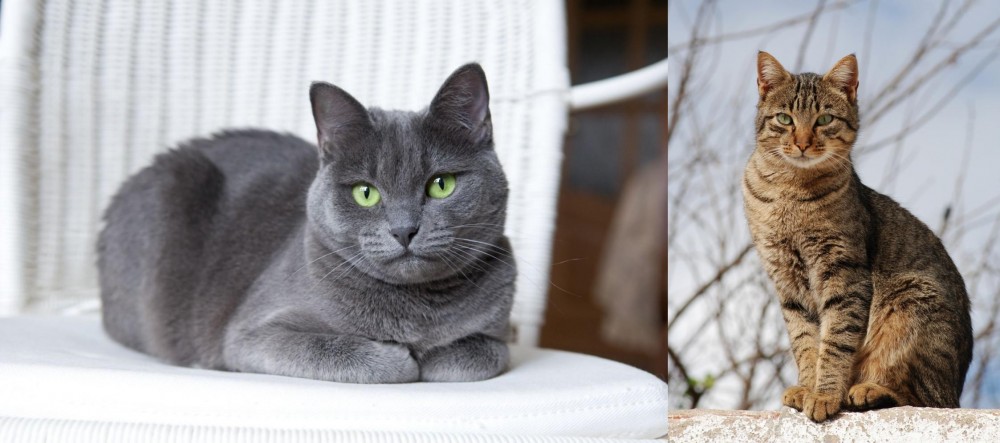 Russian Blue is originated from Russia but Tabby is originated from United Kingdom. Both Russian Blue and Tabby are having almost same weight. Both Russian Blue and Tabby has same life span. Both Russian Blue and Tabby has same litter size. Russian Blue requires Low Maintenance. But Tabby requires Moderate Maintenance
Russian Blue is originated from Russia but Tabby is originated from United Kingdom. Both Russian Blue and Tabby are having almost same weight. Both Russian Blue and Tabby has same life span. Both Russian Blue and Tabby has same litter size. Russian Blue requires Low Maintenance. But Tabby requires Moderate Maintenance
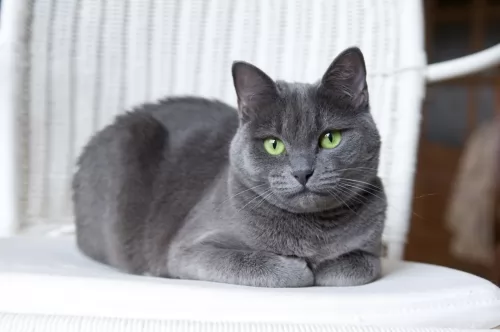 It is believed that this beautiful cat originates from Russia, and more specifically the Archangel Isles.
It is believed that this beautiful cat originates from Russia, and more specifically the Archangel Isles.
It is also thought that these cats descended from cats that were kept by the Russian Czars and that they arrived in England and Northern Europe during the 1860s. It appeared in cat shows and by 1912 it was given its own classification.
The cat was also introduced to the United States in the early 1900s and today it is a popular domesticated pet.
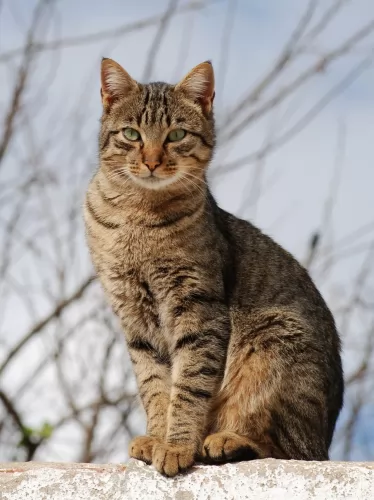 The Tabby isn’t a cat breed but rather a certain cat pattern. So the Tabby has lots of different coat colors and patterns and the cat comes in different sizes.
The Tabby isn’t a cat breed but rather a certain cat pattern. So the Tabby has lots of different coat colors and patterns and the cat comes in different sizes.
You get the mackerel Tabby, the classic Tabby, the spotty Tabby and the ticked Tabby. The Tabby is a domestic cat. It is thought that today’s Tabby’s originated from the African wild cat because the markings are so similar.
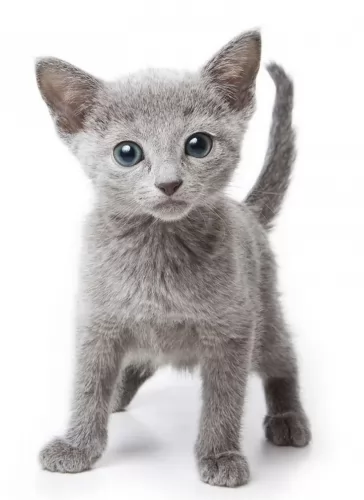 The medium-sized Russian blue cat is slender, strong, and muscular with long legs. He can weigh between 3 and 6kg.
The medium-sized Russian blue cat is slender, strong, and muscular with long legs. He can weigh between 3 and 6kg.
He has a beautiful blue, soft double coat that is short and thick. The coat is an even color with silver tips. What is an attractive feature of this cat too is that his double coat doesn’t shed much. The cat has a triangular-shaped head with yellow to green eyes.
The Russian Blue is such an amicable, sweet-tempered cat that likes nothing more than to be in the company of his human owners, He is calm and independent. They do well living with their human families but they do tend to form a deep bond with that one special person.
He will even follow his owner everywhere and is a loving, loyal companion. The Russian Blue is a social cat but also enjoys some quiet time out just to chill. He also isn’t too fond of visitors and may run away and hide if the occasion becomes too large and noisy.
This is a cat that will miss you when you’re at work all day but he is able to quietly wait for your arrival back home. Then he will appreciate some playtime.
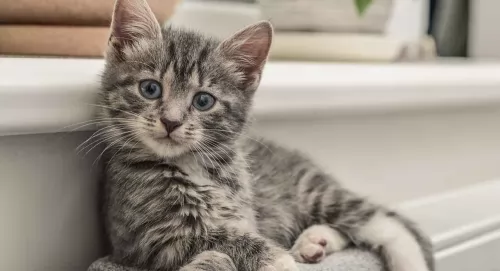 The Tabby is any domestic cat. They’ve got a distinctive 'M' shaped marking on their forehead.
The Tabby is any domestic cat. They’ve got a distinctive 'M' shaped marking on their forehead.
The Tabby cat isn’t a breed of cat but actually a coat type and in fact, there are quite a few cat breeds with the Tabby pattern.
Tabby is a color pattern in other words and it means you will find stripes, spots, and whorls of color. Tabby cats can range in size because of the different breeds. They can be medium to large and weight between 3 and 7kg.
The eye and ear shape will also vary according to the different breeds as well as the thickness of the tail.
Your Tabby is a friendly, social cat. He makes an excellent pet and companion. The orange and ginger tabbies are more feisty and strong-willed. These cats cat can be any personality really and you might have an aloof cat but you could also have a highly social, vocal Tabby.
Most times you will get an active, playful, friendly cat that will love the company of his human family.
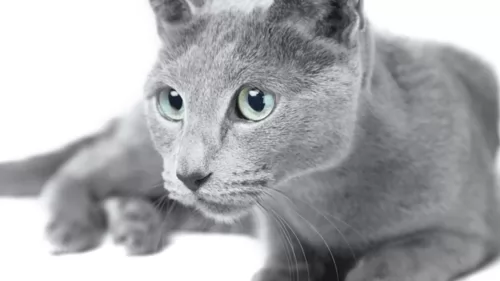 Your Russian Blue is such an intelligent cat and for this reason, when you bring one into your home, you’ll need to provide him with lots of stimulating toys and fun play times.
Your Russian Blue is such an intelligent cat and for this reason, when you bring one into your home, you’ll need to provide him with lots of stimulating toys and fun play times.
This is also a low maintenance cat and a brush once a week will be all that is required.
These are cats that love their mealtimes and you’ll want to work out a special eating program to ensure he gets all the nutrition he needs without over-eating.
Respond with lots of love and attention to your vocal Russian Blue, and you’ll soon see what a precious jewel this cat is as a companion and friend.
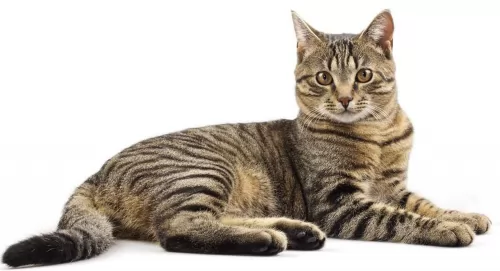 When you bring a Tabby cat into your home, you can't tell what personality he will have. A lot depends on the lifestyle you provide him with.
When you bring a Tabby cat into your home, you can't tell what personality he will have. A lot depends on the lifestyle you provide him with.
Some Tabby cats are social and friendly while others are more shy. One thing is sure, they all thrive on the love and attention of their human families. This popular cat is guaranteed to make you a most wonderful pet and companion.
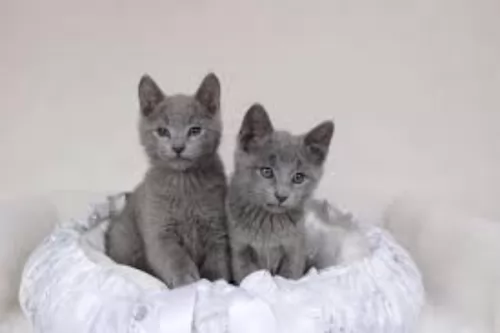 Because the Russian Blue is a naturally occurring breed, they are fairly healthy cats. Watch out for obesity and urinary tract infections with your cat.
Because the Russian Blue is a naturally occurring breed, they are fairly healthy cats. Watch out for obesity and urinary tract infections with your cat.
Obesity shortens a cat’s life. It puts extra pressure on the cat’s joints and it makes them more likely to develop disease. Then again, it is dangerous to suddenly put your obese cat on a strict diet so that he loses weight too quickly.
Your cat requires a gradual decrease in body weight. If you’re worried about your cat’s weight, rather speak to a veterinary surgeon who can explain to you and also draw up a weight loss program for your cat.
Remember too, that cats are carnivores and they simply have to have meat in their diet. Commercially manufactured cat foods of the highest quality are high in protein and low in carbohydrates.
Feline lower urinary tract disease is no joke for a cat. This disease affects your pet’s lower urinary tract – the bladder. Causes include bladder stones or bladder infections and inflammation in the urinary bladder.
You may notice your cat battling to urinate. Your cat will also no doubt cry out while trying to urinate and this is because the process is so painful. There may also be blood in the urine.
You may notice that your cat isn’t using his litter box but urinating elsewhere. Your cat will need to get to the vet as soon as possible. It may not be a life-threatening disease but it can be highly uncomfortable for your cat.
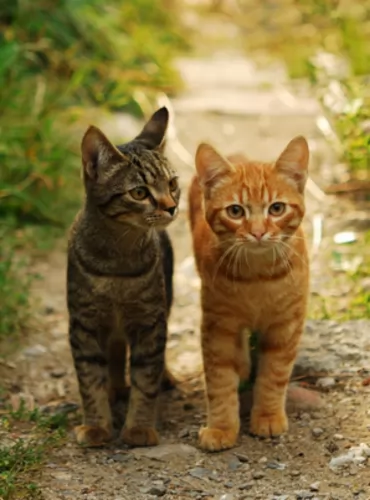 Many cats can develop liver and kidney troubles as they get older so it’s important to visit a vet regularly in order to make sure they are in good health.
Many cats can develop liver and kidney troubles as they get older so it’s important to visit a vet regularly in order to make sure they are in good health.
Most domesticated tabby cats live for 12 to 15 years and this means you can enjoy many years of good friendship from your Tabby.
The liver is an important organ with a host of functions. We know it plays an important role in removing toxic substances from the blood. Because this organ works to rid the body of so many different substances, it can become damaged.
Liver disease results in inflammation, which is known as hepatitis. If left, it can lead to loss of function because of scar tissue. Luckily, liver disease in cats can be treated and managed,
Age, certain diseases and certain breeds of cats are more susceptible to liver disease. Obesity too, can contribute to liver disease. The signs of liver disease are weight loss, increased thirst, vomiting, drooling, jaundice and loss of appetite.
If your cat is diagnosed with liver disease, speak to your vet about a special diet for your cat.
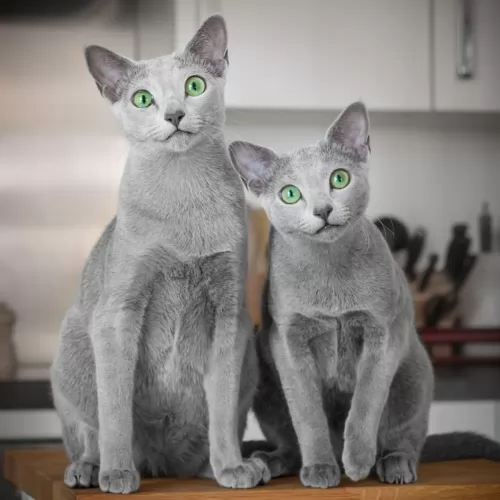 The Russian Blue’s beautiful blue coat is short and thick and will do well with a brush once a week. The cat just thrives on the attention during brush time too.
The Russian Blue’s beautiful blue coat is short and thick and will do well with a brush once a week. The cat just thrives on the attention during brush time too.
Trim your Russian blue’s nails regularly.
Provide your cat with everything he needs to make his life pleasant. Food and water bowls, a litter box, a collar and tag, a nice soft bed, grooming accessories, climbing tree, and a scratching post.
Make sure he has his cat vaccines and is treated for parasites.
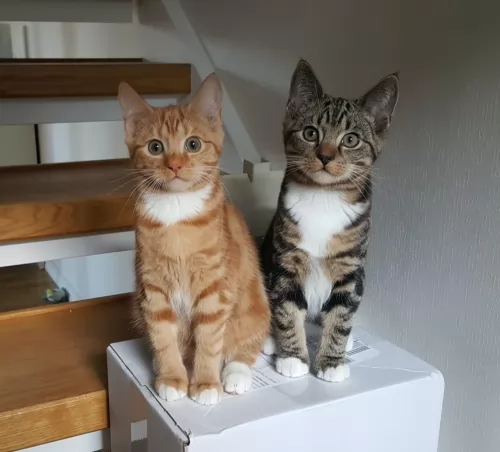 When your cat is a Tabby, he could have short or long fur, and a weekly brushing will be necessary to remove dead hairs and dust from the coat.
When your cat is a Tabby, he could have short or long fur, and a weekly brushing will be necessary to remove dead hairs and dust from the coat.
While you brush your cat, feel for any irregularities such as lumps or cuts. A lump should be examined by the vet.
As already mentioned, good food is key to good health, and as your cat is a carnivore, he will require meat. There are many excellent cat food manufacturers who produce cat food with all the nutrients your feline friend requires.
If your pet needs to be transported anywhere, such as to the vet, make sure he can be carried safely by putting him in a cat carrier box.